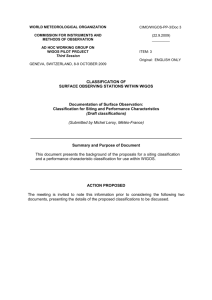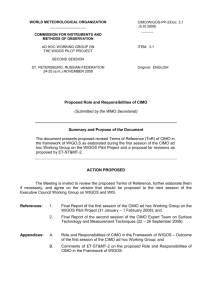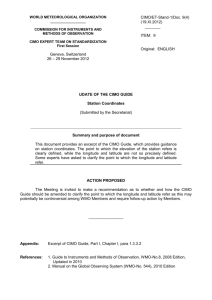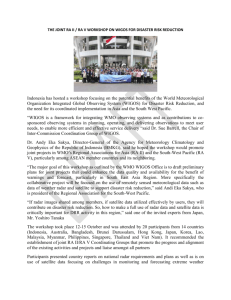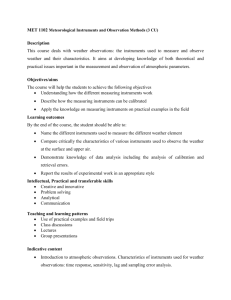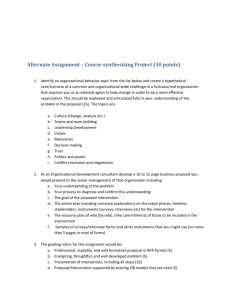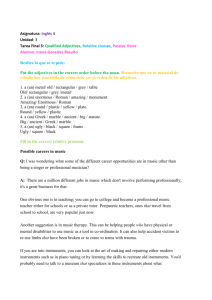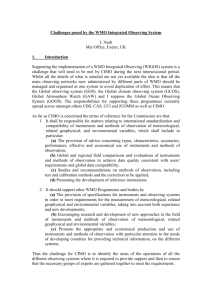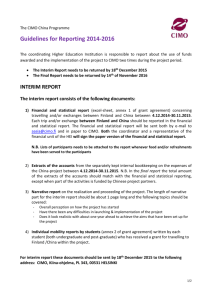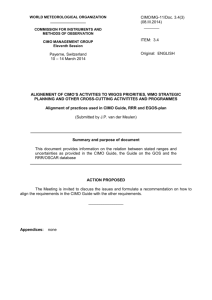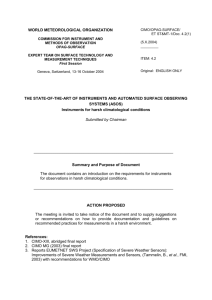Doc-3-2_ToRs
advertisement
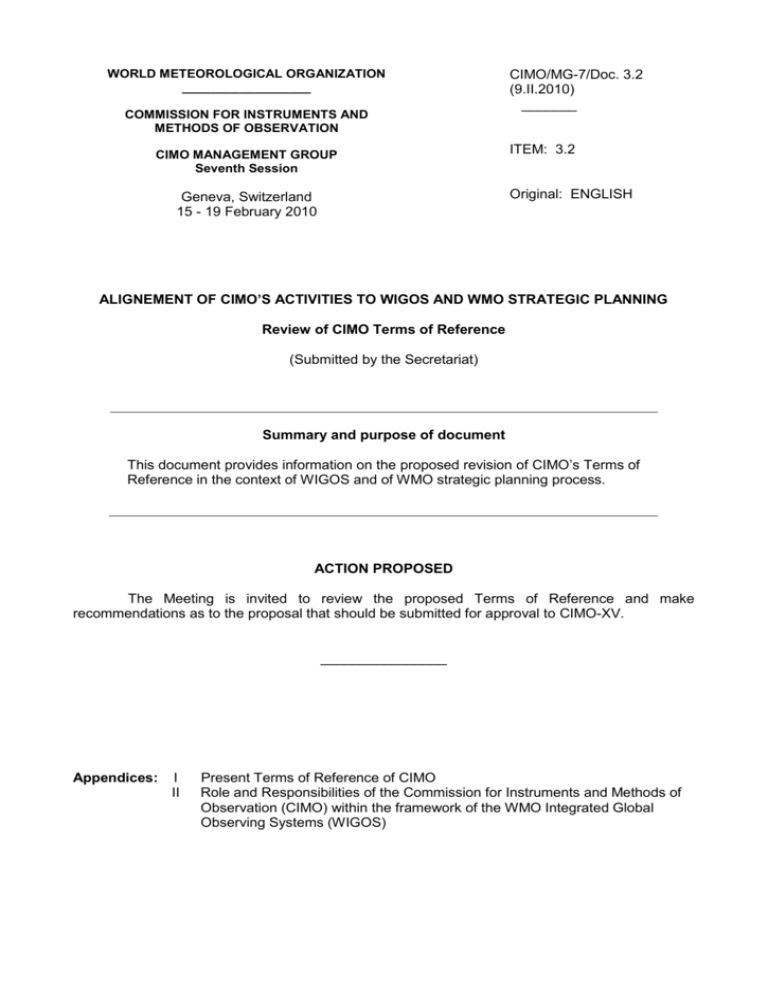
WORLD METEOROLOGICAL ORGANIZATION __________________ COMMISSION FOR INSTRUMENTS AND METHODS OF OBSERVATION CIMO MANAGEMENT GROUP Seventh Session CIMO/MG-7/Doc. 3.2 (9.II.2010) _______ ITEM: 3.2 Original: ENGLISH Geneva, Switzerland 15 - 19 February 2010 ALIGNEMENT OF CIMO’S ACTIVITIES TO WIGOS AND WMO STRATEGIC PLANNING Review of CIMO Terms of Reference (Submitted by the Secretariat) Summary and purpose of document This document provides information on the proposed revision of CIMO’s Terms of Reference in the context of WIGOS and of WMO strategic planning process. ACTION PROPOSED The Meeting is invited to review the proposed Terms of Reference and make recommendations as to the proposal that should be submitted for approval to CIMO-XV. ________________ Appendices: I II Present Terms of Reference of CIMO Role and Responsibilities of the Commission for Instruments and Methods of Observation (CIMO) within the framework of the WMO Integrated Global Observing Systems (WIGOS) CIMO-MG-7/Doc. 3.2, p. 2 REVIEW OF THE CIMO TERMS OF REFERENCE 1. Congress and its Executive Council moved to a Results Based Budget/Results Based Management (RBB/RBM) framework. Currently it is expected that the next WMO Congress (Cg-16 in mid-2011) will put in place a system for management of the organization that would include five Strategic Thrusts and eight Expected Results. 2. Many of the major new challenges faced by WMO require that the technical commissions work more actively with one another to address issues in a cross-cutting fashion and support the new emerging issues of the Organization. Therefore, at the meeting of the President of Technical Commissions (PTC), the presidents were tasked to review the Terms of Reference (ToRs) of their commissions in view of best supporting the major goals of the organization. It was agreed that the individual ToRs of the technical commissions would not refer directly to the specific expected results of the organization. However, the general ToRs applying to all commissions would refer in a general manner to the strategic planning of the organization and request the technical commissions to develop their own operating plan to support the expected results of the organization. The present Terms of Reference of CIMO are provided in Appendix I. 3. In the context of the CIMO Pilot Project on WIGOS, the Ad-hoc Working Group had reviewed the Role and Responsibilities of CIMO within the framework of WIGOS. In this process the PTC and the other pilot projects had been consulted. The proposed Role and Responsibilities of CIMO in the framework of WIGOS as finalized by the Ad-hoc Working Group are provided in Appendix II. 4. Congress is responsible for the formal approval of any changes to the Terms of Reference of Technical Commissions. _________________ CIMO-MG-7/Doc. 3.2, APPENDIX I Present Terms of Reference of the Commission for Instruments and Methods of Observation (CIMO) General terms of reference applying to all technical commissions Within its terms of responsibility as defined hereunder and within the provisions of these Regulations, each technical commission shall: 1. Study and review advances in science and technology, keep Members informed and advise Congress, the Executive Council and other constituent bodies on these advances and their implications; 2. Develop, for consideration by the Executive Council and Congress, proposed international standards for methods, procedures, techniques and practices in meteorology and operational hydrology including, in particular, the relevant parts of the Technical Regulations, guides and manuals; 3. Under the general guidance of Congress and the Executive Council, carry out functions— with other bodies as necessary—relating to the planning, implementation and evaluation of the scientific and technical programme activities of the Organization; 4. Provide a forum for the examination and resolution of relevant scientific and technical issues; 5. Promote training by assisting in the organization of seminars and workshops and in the preparation of related material and the development of other suitable m echanisms for the transfer of knowledge and methodology, including the results of research, between Members; 6. Promote international cooperation and maintain, through appropriate channels, close cooperation on scientific and technical matters with other rele vant international organizations; 7. Make such recommendations as it may consider necessary. Individual terms of reference Commission for Instruments and Methods of Observation (CIMO) (1) The Commission shall be responsible for matters relating to international standardization and compatibility of instruments and methods of observation of meteorological, and related geophysical and environmental variables, which shall include in particular: (a) The provision of advice concerning types, characteristics, accuracies, performance, effective and economical use of instruments and methods of observation; (b) Global and regional field comparisons and evaluations of instruments and methods of observation to achieve data quality consistent with users’ requirements and global data compatibility; (c) Studies and recommendations on methods of observation, including test and calibration methods and the correction to be applied; (d) Promoting the development of reference instruments. (2) In addition, the Commission shall: (a) Support other WMO Programmes and bodies through the provision of specifications for instruments and observing systems in order to meet requirements for the measurement of meteorological, and related geophysical and environmental variables, taking into account both experience and new developments; CIMO-MG-7/Doc. 3.2, APPENDIX I, p. 2 (b) Encourage research and development of new approaches in the field of instruments and methods of observation of meteorological, and related geophysical and environmental variables; (c) Promote the appropriate and economical production and use of instruments and methods of observation with particular attention to the needs of developing countries. ________________ CIMO-MG-7/Doc. 3.2, APPENDIX II Role and Responsibilities of the Commission for Instruments and Methods of Observation (CIMO) within the framework of the WMO Integrated Global Observing Systems (WIGOS) (as developed by CIMO WIGOS-PP2) Within the framework of the WMO Integrated Global Observing Systems (WIGOS): The Commission shall be responsible for matters relating to international standardization, compatibility and sustainability of instruments and methods of observation of meteorological, climatological, hydrological, oceanographic, and related geophysical and environmental variables. This responsibility underpins all observations within WIGOS, and will be carried out in close consultation with relevant WMO partner organizations that co-sponsor, own and/or operate some of the observing systems. This shall include in particular (priority to be defined at later stage): (e) Respond to the requirements for standardized and compatible observations, including data content, quality and metadata; (f) Provide advice, and recommendations, and promote studies concerning effective and sustainable use of instruments and methods of observation, including quality management procedures such as methods for testing, calibration and quality assurance; (g) Conduct and / or coordinate global and regional intercomparisons and performance testing of instruments and methods of observation; (h) Promote the development of measurement traceability to recognized international standards, including reference instruments and effective hierarchy of world, regional, national and lead centres for instrument calibration, development and testing; (i) Promote compatibility, inter-calibration, integration and inter-operability with respect to both, and between, space-based and surface-based (in situ and remote-sensing) observations, including conducting testbed observing experiments; (j) Encourage research and development of new approaches in the field of instruments and methods of observation of meteorological, climatological, hydrological, oceanographic, and related geophysical and environmental variables; (k) Promote the appropriate and economical production and use of instruments and methods of observation with particular attention to the needs of developing countries; and (l) Support training and capacity-building activities in the area of instruments and methods of observation. (m) Liaise with the scientific research community and HMEI in introducing new observing systems into operations

